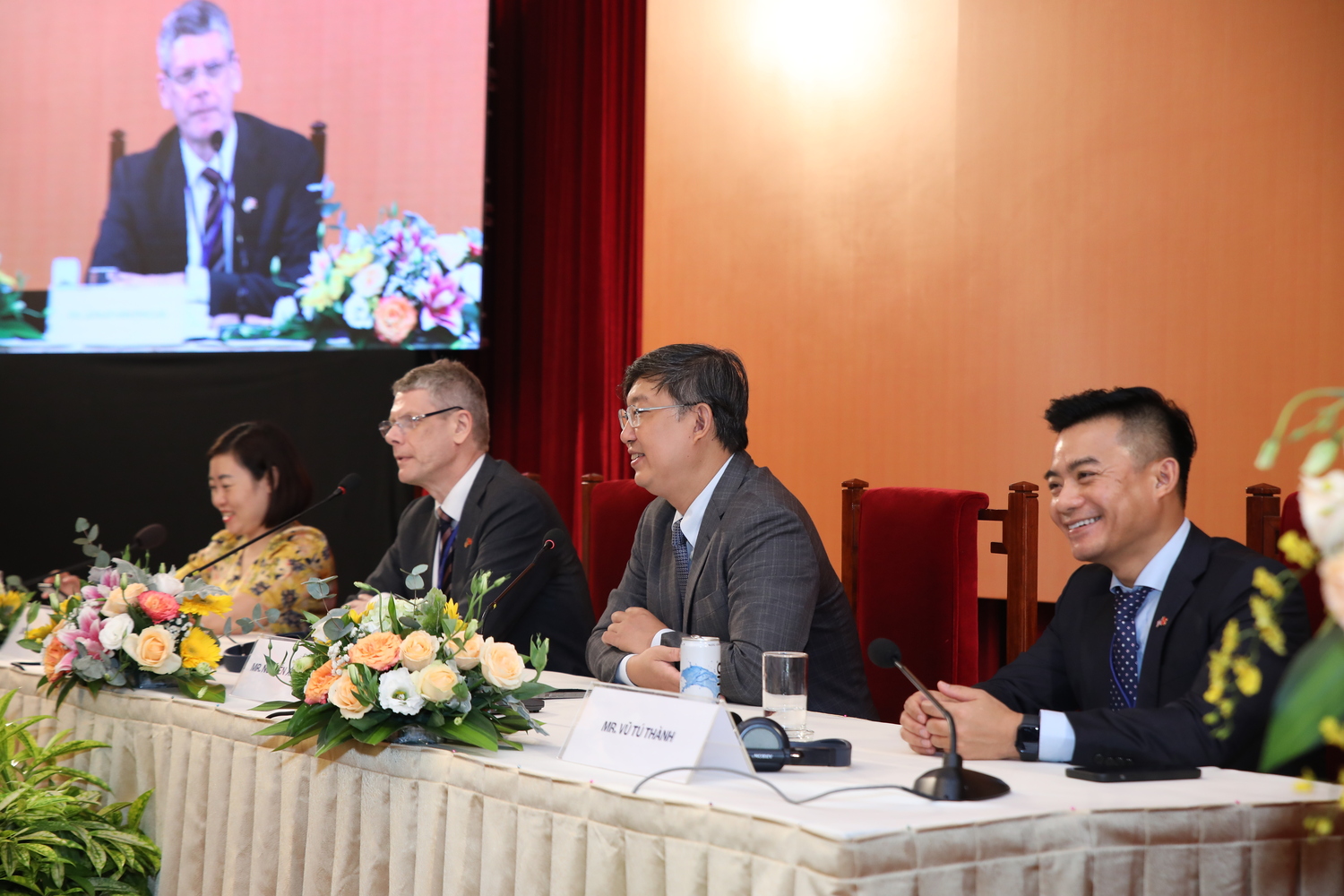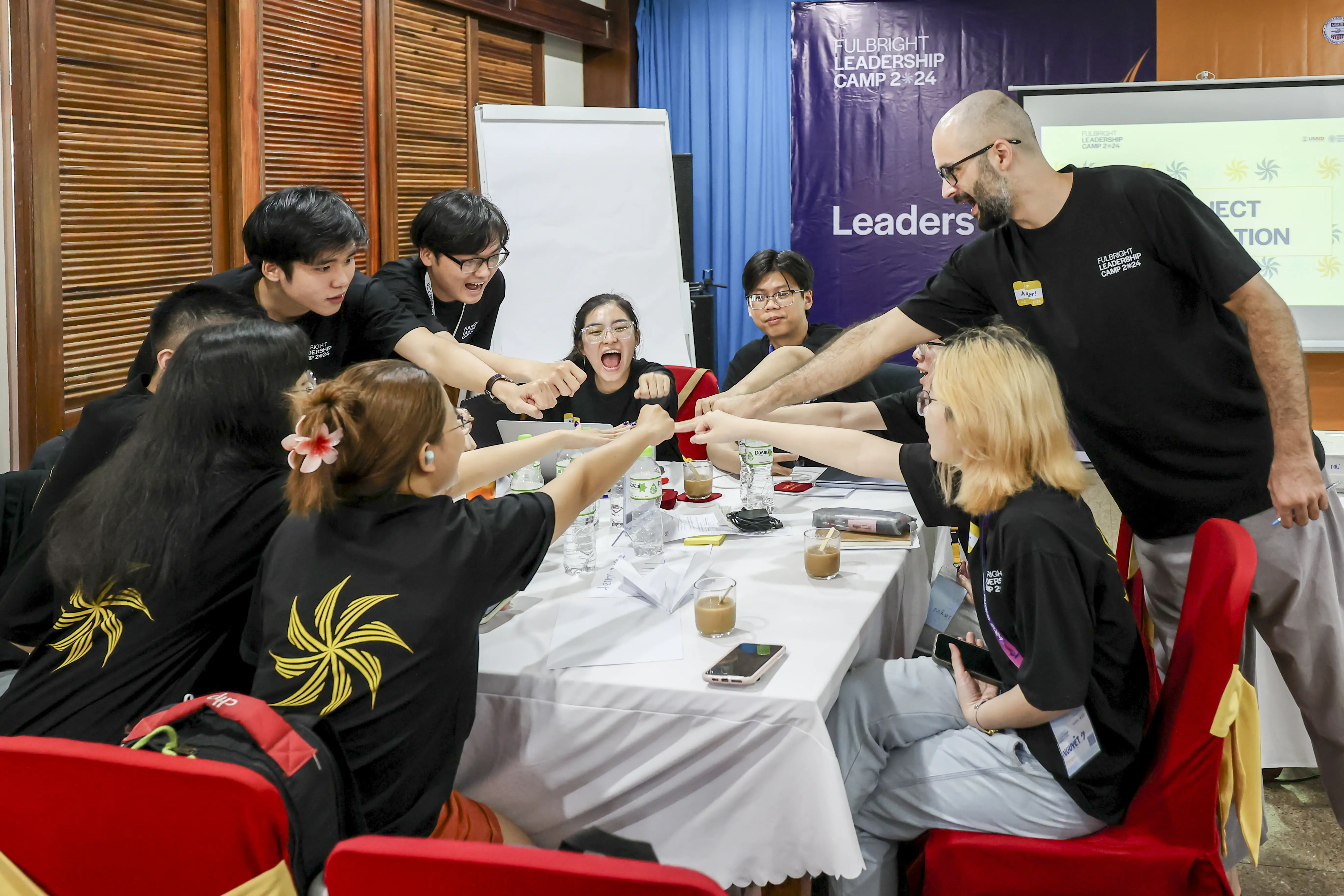
Since the US and Vietnam officially normalized diplomatic relationships over a quarter of a century ago, the two countries have walked alongside each other through numerous important milestones in the development of economics and trade of both countries. While the roads may have been rocky the past few years due to the global pandemic, US and Vietnam, just like the rest of the world, are gearing up to ride on the headwinds, heading towards a more exciting future full of potential. To reflect on past collaboration efforts, to assess the current situations, and to discuss future prospects, experts gathered and tackled thought-provoking questions at a panel of the US – Vietnam’s 27th anniversary conference, co-hosted by Fulbright University Vietnam and the US Consulate General in Ho Chi Minh City.
The shared milestones
July 1995 marked the new beginning of the relationship between Vietnam and the United States when both countries put aside the past to become partners, opening a new chapter in the history of bilateral relations. Over the past 27 years, the two countries have made great strides in the development of comprehensive relations in all aspects, from politics, security and defense, to people-to-people exchanges, academic exchanges, etc., and it is impossible not to mention the remarkable progress in economics and trade.
Only one year after officially normalizing relations, the US sent to Vietnam a draft of the Bilateral Trade Agreement. With the efforts of the two negotiating teams combined with Vietnam’s updates and adjustments of legal and economic frameworks based on the principles of the world’s number one economy, the two countries successfully put this trade agreement into effect in 2001. Until now, experts still consider this BTA to be an extremely important trade agreement in Vietnam’s development process because it plays a role of leverage for the country’s economic encroachment into the world market.
Dr. Jonathan Pincus – Chief Economist of UNDP Vietnam, said: “The Bilateral Trade Agreement is a breakthrough, paving the way for Vietnam’s economy to integrate into the world. […] The successful negotiation of the BTA partly gave the Vietnamese Government confidence to continue participating in and signing other trade agreements and helped Vietnam gradually assert its position in the regional arena as well as in the global market.”
Following the BTA, Vietnam quickly joined the international race, officially entered the World Economic Organization (WTO) in 2007, and as of last year, Vietnam has signed 15 free trade agreements.
Mr. Nguyen Xuan Thanh, Lecturer at the Fulbright School of Public Policy and Management also pointed out a remarkable point: Vietnam is one of the few countries in the Asia-Pacific region that actively participates in diverse new FTAs such as the Comprehensive and Progressive Agreement for Trans-Pacific Partnership (CPTPP), the Regional Comprehensive Economic Partnership (RCEP), and most recently, the Indo-Pacific Economic Framework (IPEF). It is thanks to the catalyst of the first success – the BTA with the US – and knowing how to seize the opportunity strategically, Vietnam is increasingly integrating into the big playing field.
BTA has been serving as a launchpad for trade activities between the two countries and US investment in Vietnam, which had seen a major breakthrough, galloping up nearly 250 times from 450 million USD in 1995 to more than 111 billion USD in 2021. For many consecutive years, the United States has always been Vietnam’s largest export market and Vietnam is one of the US’s highest-growth export markets.
Can there ever be a trade balance?
“One of the most fundamental and important lessons about economic development is the crucial role that exports play,” Dr. Pincus emphasized. In general, Vietnam is a major and important exporter of agricultural products and manufactured goods in the region and the world. Considering the US alone, Vietnam’s exports are growing in all categories “with great competitiveness”, the bilateral turnover of the two countries in 2021 will increase by nearly 21 billion USD compared to the same period in 2020, and this is an extremely impressive point when placed in the context of the Covid-19 pandemic affecting the global supply chain. However, the items we export are still limited, such as footwear and agricultural products, with a market share that has not grown significantly, and Vietnam’s export activities are “not as dynamic as some other countries”.
In fact, the economies of Vietnam and the United States are increasingly complementing each other, but are often assessed as unbalanced with “surplus/deficit” being a frequently mentioned keyword. While Vietnam has strong exports to the US such as seafood, cashew nuts, textiles, leather shoes, etc., the US provides Vietnam with high-tech products, which must include energy investment projects or aircraft purchase contracts that Vietnam’s economy is yet capable to import.
With experience working closely with US companies in Vietnam, Mr. Vu Tu Thanh, Deputy Regional Managing Director and Vietnam Representative for the US-ASEAN Business Council, shared: “Vietnam is considered an important factor in the global supply chain for the US market. Last year when Vice President of the United States Kamala Harris visited Vietnam, we [the leading US manufacturing operators in Vietnam] had the opportunity to sit at a roundtable to discuss with the delegation about the security of supply chains that have been disrupted by the pandemic. With full confidence, the US emphasizes its interest in the recovery and stability of the Vietnamese economy because Vietnam is an important link to help ensure the security of the global supply chain for the US market.”
Mr. Nguyen Xuan Thanh said that the situation of “trade surplus/deficit” between Vietnam and the US will continue to increase because of the nature of the products that we export and import. He expressed confidence in the two economic negotiating delegations between the two countries, when both have goodwill and are willing to share databases, promising to ensure transparency in the management of interest rates, and foreign exchange rates, that is the best way to maintain the stability of the macro- and micro-economy.
“The problem of imbalance in economic relations, specifically between Vietnam and the United States, is not a problem of economics. Because, a trade balance is when we have a trade surplus relationship with some countries and some industries, and a trade deficit with other countries and other industries” – Dr. Pincus explicated. According to him, taking advantage of and promoting the strengths of the domestic economy is the smartest strategy. In the context of global economic integration, especially with the catalysis of free trade agreements, economic relations between countries will be balanced when they actively complement one another.
Catching up with global standards
Accompanying the opportunities of the ever-expanding international trade of goods and services are also a number of barriers to minimum quality requirements before being able to access and penetrate the global market. And it’s not surprising that the power to set those international standards is in the hands of the “big guys”. Although there may be some requirements with challenging difficulty, that is what promotes the development of economic strength of developing countries.
Regional and global trade agreements also fuel government discussions on labor standards, environment, etc., and most recently, regulations on the digital economy under the IPEF framework. Mr. Tu Thanh shared that “some points of the IPEF have been an effective lever for advocacy work on the digital economy with governments across ASEAN“. When digital industry information, data and opinions are shared and mirrored across member states to find a common standard, we can collectively guide, draft and adopt regulations to develop together and exchange and compete in a fair and healthy manner.
The economic future of Vietnam, like that of other countries, will largely be determined by its ability to develop, absorb and use new technologies. In addition to the digital economy, high-tech industries are also noteworthy. More and more large US corporations are interested in expanding their business operations, manufacturing in Vietnam, or pouring new capital in to reorganize their supply chains, notably including semiconductor technology (such as Apple, and Dell are gradually moving to Vietnam), or clean energy (such as billion-dollar projects on wind power). However, Vietnam still needs to align its regulatory frameworks, create favorable conditions for such investments, and keep pace with international standards to be able to accept these high-tech orders.
Looking at Vietnam’s history of economic renewal, Mr. Xuan Thanh pointed out: “whenever Vietnam follows international standards and commitments, we win, and whenever Vietnam tries to create its own rules, “exceptionalism”, we lose.” Indeed, each of the external factors that Vietnam faces creates conditions for internal reform. And with the United States as one of the largest markets, with the most substantial consumption power, the fact that Vietnam and the United States continue to nurture a comprehensive relationship is a way to help Vietnam quickly improve its capacity to compete in the international arena.









